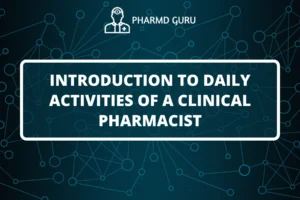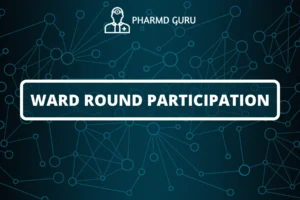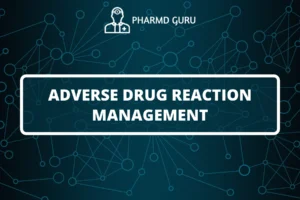ROLE OF PHARMACIST IN MANAGEMENT OF ADR:
Pharmacists play a crucial role in the management of ADR as medication experts who are well-positioned to identify, prevent, and manage ADRs. Their knowledge and expertise in drug therapy make them valuable contributors to patient safety and optimal medication use. This article highlights the significant role pharmacists play in the management of ADRs.
SCROLL DOWN TO THE BOTTOM OF THE PAGE FOR ACTUAL NOTES
TABLE OF CONTENTS:
- Introduction
- Identification and Reporting of ADRs
- Assessment and Evaluation of ADRs
- Prevention of ADRs
- Education and Counseling
- Collaboration with Healthcare Teams
1. Introduction
ADRs are a common concern in medication therapy, and their management requires a comprehensive approach. Pharmacists, as medication experts, possess the knowledge and skills to detect, evaluate, and manage ADRs, ensuring patient safety and optimal medication outcomes.
2. Identification and Reporting of ADRs
Pharmacists are often the first point of contact for patients experiencing medication-related symptoms. They are trained to identify potential ADRs by reviewing medication profiles, patient histories, and reported symptoms. Pharmacists play a crucial role in reporting ADRs to regulatory authorities and contributing to pharmacovigilance programs, thus providing valuable information for medication safety monitoring and regulatory actions.
3. Assessment and Evaluation of ADRs
Pharmacists assess and evaluate ADRs to determine their severity, causality, and impact on patient well-being. They use their expertise to analyze medication regimens, potential drug interactions, and patient-specific factors to identify the causative medication. Pharmacists employ various tools and algorithms to evaluate the likelihood of a drug causing the ADR, allowing for appropriate interventions and prevention strategies.
4. Prevention of ADRs
Pharmacists actively participate in preventing ADRs through several approaches:
- Medication Review: Pharmacists conduct comprehensive medication reviews to identify potential ADRs, such as drug-drug interactions, contraindications, or inappropriate medication use. They collaborate with prescribers to optimize medication therapy and minimize the risk of ADRs.
- Patient Counseling: Pharmacists provide education and counseling to patients regarding their medications, potential side effects, and strategies to minimize ADR risks. They emphasize the importance of adherence, proper medication use, and the timely reporting of any adverse effects.
- Medication Safety Programs: Pharmacists contribute to the development and implementation of medication safety programs within healthcare settings. They actively participate in medication error prevention, monitoring of high-risk medications, and implementation of protocols to minimize ADR occurrence.
5. Education and Counseling
Pharmacists play a vital role in patient education and counseling regarding ADRs. They provide clear and concise information about potential side effects, signs of ADRs, and steps to take if they occur. Pharmacists address patient concerns, promote medication adherence, and empower patients to actively participate in their own healthcare.
6. Collaboration with Healthcare Teams
Pharmacists collaborate with healthcare teams to ensure effective management of ADRs. They communicate with prescribers, nurses, and other healthcare professionals to discuss ADRs, share information, and develop appropriate treatment plans. This collaborative approach ensures coordinated and comprehensive care for patients experiencing ADRs.
ACTUAL NOTES




